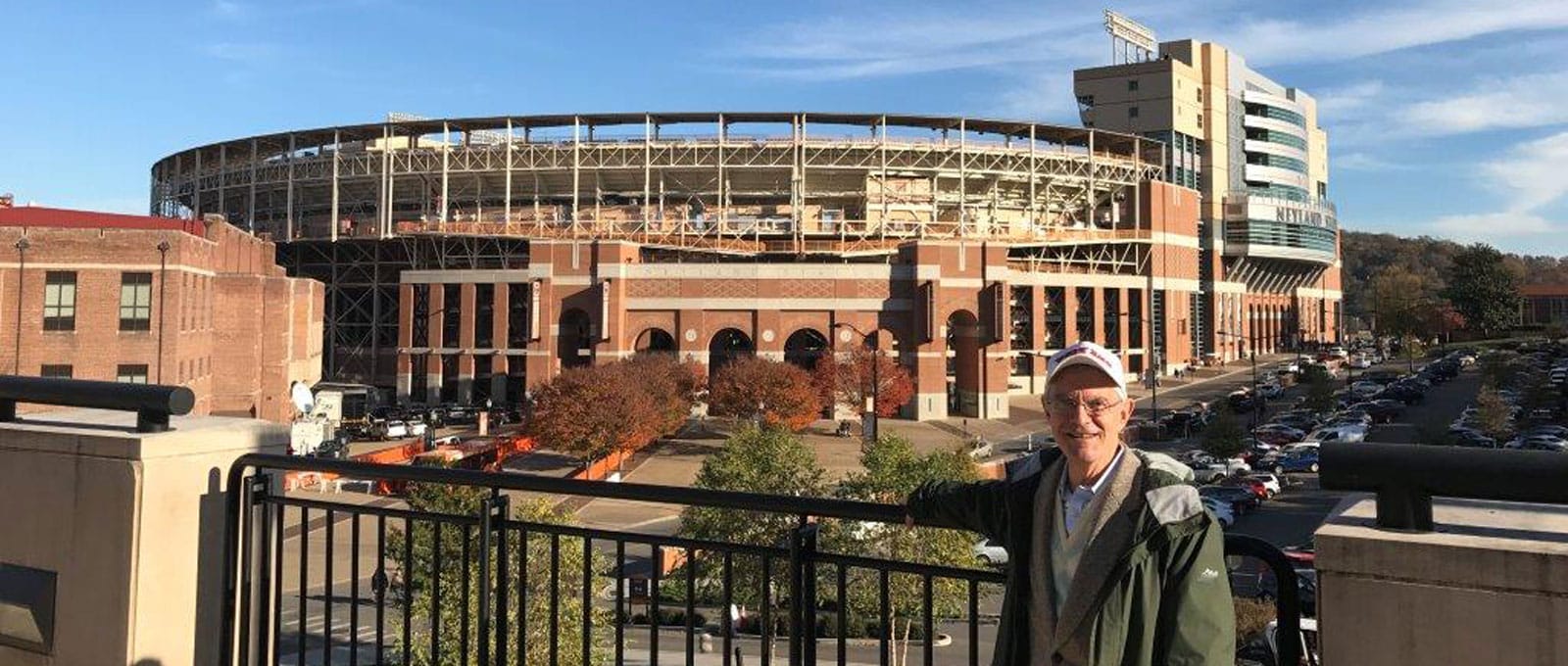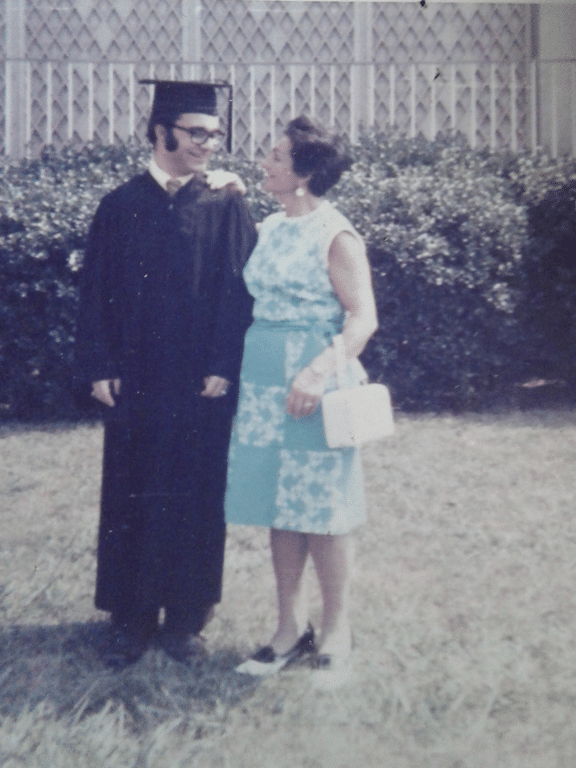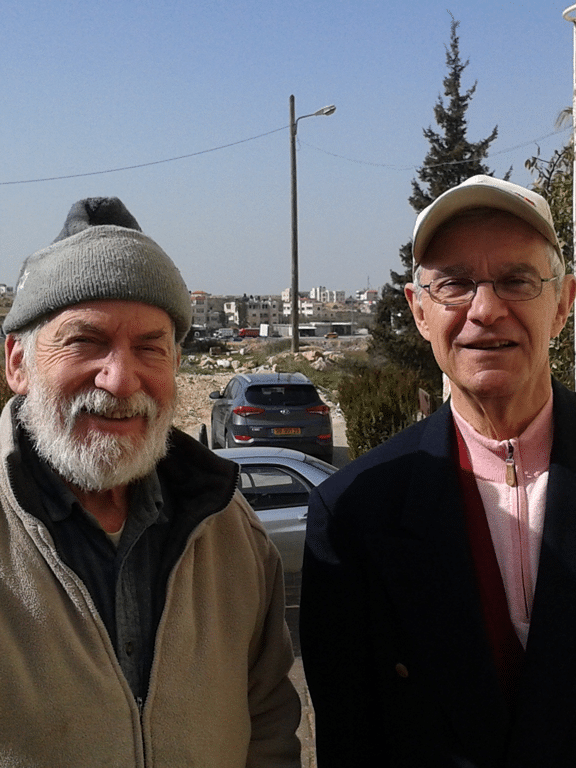
Bob Andrews’ Judaic Studies and Haslam College of Business scholarship endowments provide opportunities for students and honor the memory of his parents and family.
“Once a West Ender, always a West Ender,” says Bob Andrews (’72), remembering his Boston childhood. “It was a close neighborhood—multiethnic, everybody got along with everybody else. Everybody took care of each other. It was a family-type atmosphere. Max Nimoy was a barber. He cut my hair for years. We would discuss Leonard [his son] and how he was doing in his career.”
Now retired, Andrews volunteers two days a week at the West End Museum, which celebrates the neighborhood’s history from 1880 until it was razed by urban renewal in 1958. “Seven thousand people were uprooted,” he says. “Some had no time to find an apartment. We get people from all over the world who want to know what it was like to grow up there.”
In recent years Andrews has also taken the opportunity to celebrate two other formative influences in his life by establishing one endowment supporting a variety of opportunities for the Fern and Manfred Steinfeld Program in Judaic Studies and another providing need-based scholarships for Haslam College of Business students.

“Jewish education is very important to me,” says Andrews. “My drive to invest in it comes from the drive I inherited from my maternal grandparents, my mother, and my uncle. They had a vision for us to get a proper Jewish education.
“At the same time, I want to express my gratitude to the University of Tennessee for accepting me as a senior transfer and allowing me to finish out my undergraduate degree by endowing two scholarships. When we’re young, we are taught to give back and we’re taught to honor our parents. The scholarship endowment pays homage to my parents, George and Julia (Zissel) Andrews and Dr. Earl Cherniak, for without them my life never would have changed the way it did by my coming to UT.”
It is my fond hope when people hear that UT has a Judaic Studies program, they will consider UT as their destination. I get a great pleasure knowing what my money is doing. The program here must be sustained.
– Bob Andrews (’72), endowed Judaic Studies and Haslam College of Business scholarships
Descended from Judah the King of Israel
Andrews is passionate about his family history and genealogy. Through Geni.com he has found that Judah the King of Israel is his 106th great-grandfather, and film auteur Spike Lee is his 48th cousin once removed on his mother’s side. His father’s side of the family emigrated in the 1880s from Vilna, Lithuania. Andrews’ grandfather Louis Andrews ran a variety store in Framingham, Massachusetts, and his father, George, worked for Suffolk Grocery. His mother was a homemaker and worked at a dry cleaner. Her name was Zissel at birth, but she Anglicized it to Julia when she started school. Her brother was born Yeshayahu but Anglicized to Josiah when he started school.
Like his West End barber, Andrews’ grandmother Rachel Derbaremdiker was born in Ukraine and emigrated to Boston. As the story goes, she was smuggled out of Ukraine in a hay wagon with her daughter Zissel, son Yeshayahu, and a cousin Doba (Dora in English). “When they were stopped at the Russian–Polish border,” says Andrews, “my grandmother bribed the border guard with her ancestor’s watch. They spent nine months in Warsaw before HIAS, a Jewish refugee organization, located my grandfather Solomon Derby in Boston. HIAS provided them with visas. They took the train from Warsaw to Antwerp where they boarded a boat to take them to America. They landed at Ellis Island in 1920.”
Rachel’s husband Solomon, a watchmaker, had shortened his name from Derbaremdiker to Derby because his cousin Moses, who had sponsored him, had changed his name to Derby when he came to the United States. Moses was a shochet, someone certified to slaughter cattle and poultry in keeping with Jewish law. “When she took out her citizenship, Grandma Rachel Derbaremdiker did not shorten her name,” says Andrews. “She was a very progressive woman. She was known for speaking her mind.”
Mindful of their family’s rabbinical lineage, Andrews’ grandparents made sure their three children had a Jewish education. Born in 1944, Andrews attended the West End–Poplar Street Hebrew School, then the Kehillath Israel in Brookline until 1955, when urban renewal marked the West End for demolition and the Andrews family moved to an apartment in Dorchester. “Sixty-eight dollars a month, unheated,” says Andrews, who attended Hebrew School Beth Hillel until his Bar Mitzvah in 1957.
A Circuitous Path to UT
On the secular side, Andrews went to Solomon Lewenburg Junior High and Boston English High, then entered Bentley College of Accounting and Finance in 1962. “It quickly became clear that this boy was not cut out to be an accountant,” says Andrews, who floundered for a time but received some sage words from a podiatrist named Earl Cherniak: “Get your fat ass back into night school,” he advised. “I am forever grateful to him,” says Andrews. “If it weren’t for him, I don’t know what would have happened to me.”
Andrews, then working at Aetna Life & Casualty, took Cherniak’s advice and enrolled in night school at Suffolk University. He went there for two years and Northeastern University for 4 and a half years, but he yearned for a more meaningful educational experience.
“Every kid watches college football,” says Andrews, who saw the Vols’ 38-7 victory over Florida on TV (Phillip Fulmer was an offensive guard on that 11-1 team). He learned that UT’s College of Business had an insurance major, applied, was accepted as a senior, and started in 1971. “I was grateful to my parents for supporting me in this,” says Andrews.
“UT was the first time I was ever away from home in my life at age 26. I made lifelong friends. One thing you cannot put a price on is lifelong friendship.” Andrews met Bob Zacharias, another insurance major, his second day on campus. “Today he is like family,” says Andrews. In UT’s Hillel, he bonded with Herby Dan (’72), a lawyer, who is now a baker in Bet-el, Israel, and who Andrews visited for two weeks in 2017. On a recent trip to Knoxville, Andrews reconnected with his old roommate, Charles O. Slater, a retired nuclear engineer at Oak Ridge National Laboratory, whom he last saw at Slater’s wedding in the 1970s. “The Knoxville environment was completely different from Boston. I enjoyed the laid-back style of life. I even developed an East Tennessee twang. When I met my two cousins at LaGuardia Airport, I said, ‘How y’all doin’?’ They said, ‘No way.’

Andrews’ cousin Matthew Derby was the rabbi at Temple Beth El on Kingston Pike and the Hillel at UT. “He brought me home for Shabbas dinner on a Friday night,” says Andrews. “With my 27-year-old brashness, when his wife opened the door, I said ‘Hiya Susie, long time no see.’ Her grandparents, the Slates, had owned the building we lived in at 57 Auburn Street on the West End.”
Andrews remembers his statistics professor William Sanders and the challenge of working problems on the board. Sanders (known for developing the Educational Value-Added Assessment System for measuring teacher’s effect on student performance) also introduced Andrews to the idea that it was OK to use calculators. “I’d been doing it in longhand, because that’s what I thought we were supposed to do,” he says.
Andrews graduated in 1972 with a degree in business and began his career insuring commercial lines at CNA, the Great American Insurance Company, and Brewer & Lord. He retired in 2012 from Morrill Institute after his employer Goldman, Ernest, and Liner merged with Morrill Insurance.
Giving Back and Honoring Family
In 2017, Andrews endowed a scholarship for an underprivileged Haslam College of Business student. “Those kids are the ones who get short shrift,” he says. When he returned to campus, he found out about the Judaic Studies program. After a conference call with its director, Helene Sinnreich, and advancement officer Rich Brown, Andrews said to Brown, “Rich, I have to do this.”
In honor of members of his family, he named it the Robert N. Andrews, Solomon and Rachel Derby, Rabbi Josiah Derby, Rebbitzen Adele Derby, and Rabbi Matthew Derby Judaic Studies Excellence Endowment. (Josiah Derby was the rabbi at the New York Jewish Center in New Jersey for over 40 years and wrote for the Jewish Quarterly. He founded Congregation Beth Shalom of Coconut Creek, Florida, when he retired there. Adele Derby was also involved in Jewish education.) The funding is earmarked for student scholarships, faculty research, lectures, or specific-focus topics.
“On his recent visit,” says Andrews, “when I sat in classes in the Judaic Studies program, it was very rewarding. I watched the kids and how engaged they were.” He met with Sinnreich, attended her lecture on antisemitism at the Arnstein Jewish Community Center on Deane Hill Drive, and discussed what the endowment would enable her program to do. One scholarship evolved into two.
“I hope my gift encourages other people to contribute and build the endowment up to provide scholarships for students who want to participate in the program,” says Andrews. “It is my fond hope when people hear that UT has a Judaic Studies program, they will consider UT as their destination. I get a great pleasure knowing what my money is doing. The program here must be sustained.”
